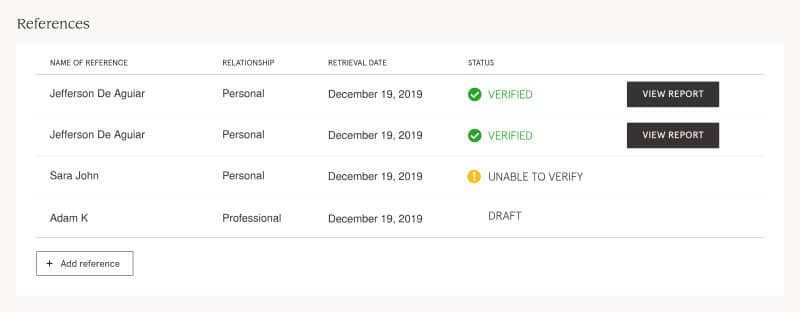As much as you may admire those iconic ways to quit a job—like the man who handed his letter of resignation in on a sheet cake, which also subtly references his new cake business—you probably recognize the impracticality of them if you want to be able to ask your soon-to-be former employer to be a reference in your future job hunting.
As unnerving as it may be to ask a former employer or professor to be a reference for an upcoming job position, references are becoming more and more crucial to keep in your back pocket.
So, what’s included in a reference check?
When a hiring professional or employer does a reference check, they usually contact your given referee to check details beyond those that could be confirmed in a regular background check.
Although there is some overlap in background checks and reference checks—as some employers and talent hunters will confirm information offered on your resume like past dates of employment, position held, and responsibilities within that position, or academic qualifications—reference checks are often used to get a better idea of who the candidate is in terms of their work ethic and personality.
Of course, the questions that the referee is asked will vary depending on what context the reference is being given, oftentimes, the referee will be asked questions that largely focus on your ability to thrive in the position at hand.
Mainly, they’re looking for details that make you unique and desirable as a candidate. This can include but is not limited to your:
· leadership skills
· level of maturity and responsibility
· critical thinking or problem-solving skills
· dedication to your field of work
What employers can and cannot ask your referee.
While laws vary between country and region, there are laws that protect you as a candidate from being discriminated against.
In Canada, a potential employer or recruiter cannot ask your referee about your:
· gender
· sex (including pregnancy or childbirth)
· marital status
· sexuality
· disability
· race
· religion
· any convictions for which a pardon has been granted.
They can ask, however, about how observations made on your work and ability to keep up with tasks and responsibilities in your position, job-related behavior, and job-related competency. After all, a good employer or recruiter should only be concerned about how well you’ll do in the job at hand to make both you and your future organization happy.
What you may not know about reference checks.
It usually is a good sign when a future employer asks for a list of references; however, it’s also important to remember that sometimes employers and recruiters do this in different parts of the hiring cycle than others, so this can even happen before your first interview.
It’s also worth noting that some employers and recruiters have taken to using backdoor reference checks to make critical hiring decisions in the place of a given list of references—that is, asking for references from former employers or other supervisors of your work who were not included in your referee list.
Although employers and recruiters may still choose to use a backdoor reference check, a great proactive action to take is to offer two to three solid referees whose positions are most relevant to the application and whose reference will speak fairly and honestly about you as a worker.
What if you’re already employed? Should you still have references?
If you’re currently working in a position you’re happy and secure in, you may think that you don’t need a reference. However, many individuals and organizations are taking to using reference checks to learn more about you beyond employment opportunities, including landlords, grant committees, and admissions offices, should you ever return to school full- or part-time.
This means having a reliable, honest reference could make or break your chances at finding an apartment or receiving a funding opportunity, or program admission.
Dos and Don’ts
Quite simply, you want to make sure your referee has as little work to do and can be prepared when a potential employer calls them to speak about you. You will want to make sure you:
· Ask for permission to use them as a reference well in advance
· Pose your request openly in case they do not feel comfortable acting as a reference for you
· Make sure to thank them for being a reference afterward (whether you get the job or not)
Happy referee, happy reference!
You can avoid constantly asking your former professors and employers for references for new jobs and other opportunities by having your reference checks validated and stored securely with Workwolf’s verification platform.

In addition to having your credentials and background checks done once and saving your future employer time and effort in conducting their own checks at the end of the hiring cycle, Workwolf offers reference checks where you can request your referee to vouch for your qualifications, skill levels, personality, and work ethic and save this record for future applications.
Like all the data you verify and save to your Workwolf personal profile, your reference checks are saved within your digital credential vault, so your referee’s words can be saved and shared with multiple future employers to view. In your personal Workwolf profile, you can store multiple references securely in your credential vault for others to view over your academic and professional career.
As well, depending on what kind of applications you’ll be using references for, Workwolf allows you to draft as many references as you need, so you can always be ready for the next reference check you’ll need when the time comes.
Want to try it out for yourself? Sign up with Workwolf today to get started.





